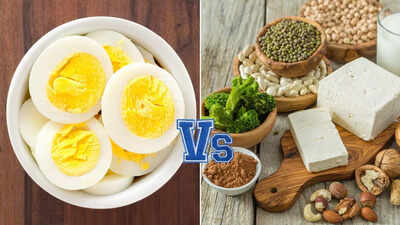Proteins are the building blocks of life, essential for repairing tissues, supporting the immune system, and producing hormones. Every cell in your body relies on protein for proper function. While eggs are often touted as a prime source, vegetarians can find ample protein in a variety of plant-based foods.

For those focused on weight management or following low-carb diets, protein is key for satiety and boosting metabolism. Nutritionist Ravneet Bhartwal recently shared a list highlighting 20 vegetarian options that surpass the protein content of a single egg.
Here's a breakdown of these protein powerhouses, per 100g serving:
For a quick and easy protein boost, the nutritionist recommends combining dal (lentils) with roti (flatbread) or rice with legumes. This combination creates a complete protein source.
Cereals and legumes complement each other, providing all nine essential amino acids the body needs. Rice and wheat are low in lysine but high in methionine, while legumes are rich in lysine but low in methionine. Eating them together ensures a balanced and complete protein intake, especially crucial for vegetarians and vegans.
According to Harvard Medical School, the recommended daily protein intake for a healthy adult is 0.8 grams per kilogram of body weight. A person weighing 75 kg needs approximately 60 grams of protein daily.
Individuals with active lifestyles or those recovering from injuries may require higher protein intake (1.2 to 1.6 g/kg). Consult a doctor to determine the appropriate amount based on your health status and activity level.
Newer articles
 Najmul Hossain Shanto Resigns as Bangladesh Test Captain Following Sri Lanka Defeat
Najmul Hossain Shanto Resigns as Bangladesh Test Captain Following Sri Lanka Defeat
 Gavaskar Calls for Kuldeep Yadav's Inclusion in 2nd Test Amid Bumrah Fitness Concerns
Gavaskar Calls for Kuldeep Yadav's Inclusion in 2nd Test Amid Bumrah Fitness Concerns
 Prasidh Krishna Targets Sharper Bowling Lengths, Aims to Curb Run Rate
Prasidh Krishna Targets Sharper Bowling Lengths, Aims to Curb Run Rate
 Samsung Galaxy A35 5G and A55 5G: Full Specs and Pricing Revealed
Samsung Galaxy A35 5G and A55 5G: Full Specs and Pricing Revealed
 Black Caps Set for Action-Packed Home Summer Against Cricket Heavyweights
Black Caps Set for Action-Packed Home Summer Against Cricket Heavyweights
 Expert Tips: How to Help Your Child Beat Distractions and Improve Focus
Expert Tips: How to Help Your Child Beat Distractions and Improve Focus
 Smith Targets Second Test Return After Unique Baseball Cage Training to Rehab Finger Injury
Smith Targets Second Test Return After Unique Baseball Cage Training to Rehab Finger Injury
 Bangladesh's Shadman Defends Batters After Day 1 Stumbles Against Sri Lanka
Bangladesh's Shadman Defends Batters After Day 1 Stumbles Against Sri Lanka
 Rishabh Pant Is Revolutionizing Cricket: Greg Chappell Lauds Unorthodox Genius
Hoặc (tùy chọn):
Greg Chappell: Rishabh Pant's 'Reinvention' of Cricket Is a Sight to Behold
Rishabh Pant Is Revolutionizing Cricket: Greg Chappell Lauds Unorthodox Genius
Hoặc (tùy chọn):
Greg Chappell: Rishabh Pant's 'Reinvention' of Cricket Is a Sight to Behold
 Sharpen Your Focus: Can You Decipher This Optical Illusion in Seconds?
Sharpen Your Focus: Can You Decipher This Optical Illusion in Seconds?